Recent Fire Damage Posts
Prevent Fires in Ebensburg and Cambria County with Professional Dryer Vent Cleaning
10/16/2024 (Permalink)
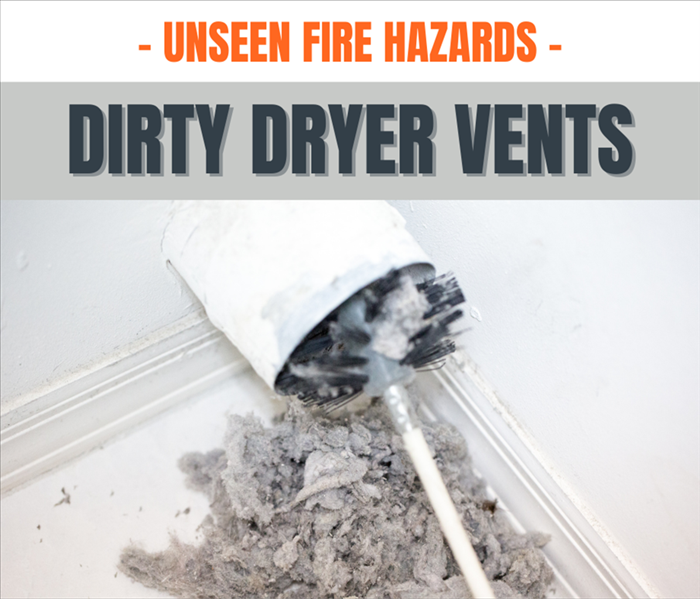 Dirty dryer vents are a hidden fire hazard that may be lurking in your home.
Dirty dryer vents are a hidden fire hazard that may be lurking in your home.
Fire cleanup in Ebensburg, Johnstown, and Cambria County often starts with small, preventable issues. One of the leading causes of home fires is clogged dryer vents. SERVPRO Team Weaver specializes in professional dryer vent cleaning, reducing fire risks and ensuring your dryer operates efficiently. Keeping your dryer vent clean is a vital step in protecting your home from potential fire hazards and costly repairs.
Why Dryer Vent Cleaning Matters in Fire Prevention
Lint, dust, and debris can accumulate in dryer vents over time, creating a serious fire risk. When airflow is blocked, the dryer overheats, and with flammable lint inside, a single spark can ignite a fire. According to the U.S. Fire Administration, failure to clean dryer vents is one of the top causes of home fires. Protecting your home from fire damage in Johnstown or anywhere in Cambria County begins with professional cleaning.
Key Benefits of Professional Dryer Vent Cleaning
- Fire Risk Reduction: Cleaning dryer vents ensures proper airflow, reducing the chance of overheating and preventing fires.
- Improved Efficiency: Clogged vents make your dryer work harder. Professional cleaning improves drying times and lowers energy bills.
- Extended Dryer Lifespan: A dryer that doesn’t overwork lasts longer, saving you money on repairs or replacement.
- Peace of Mind: SERVPRO Team Weaver uses specialized tools to thoroughly clean your vents, ensuring they are free of hazards.
How Often Should Dryer Vents Be Cleaned?
To prevent fires in Cambria County, experts recommend having dryer vents cleaned at least once a year. Larger households or frequent dryer use may require more frequent cleanings. If your dryer takes longer to dry clothes or feels unusually hot, it’s time to schedule a cleaning.
Don’t Risk a Fire – Act Now
Neglecting dryer vent cleaning increases fire risks and can also lead to carbon monoxide poisoning in homes with gas dryers. The extra strain on the appliance can result in costly repairs or replacements. Instead of waiting for a disaster, take preventive action now.
SERVPRO Team Weaver is committed to helping you avoid fire restoration costs by keeping your home safe. Call us today to schedule a professional dryer vent cleaning. Whether you’re in Ebensburg, Johnstown, or anywhere in Cambria County, we’re here to help prevent fires before they start.
Schedule Your Dryer Vent Cleaning Today
Protect your home from fire hazards by contacting SERVPRO Team Weaver for professional dryer vent cleaning. Visit our website or call us at (814) 472-0800 to learn more and schedule your service today.
What to Do After a Fire: Steps for Recovery and Restoration
8/15/2023 (Permalink)
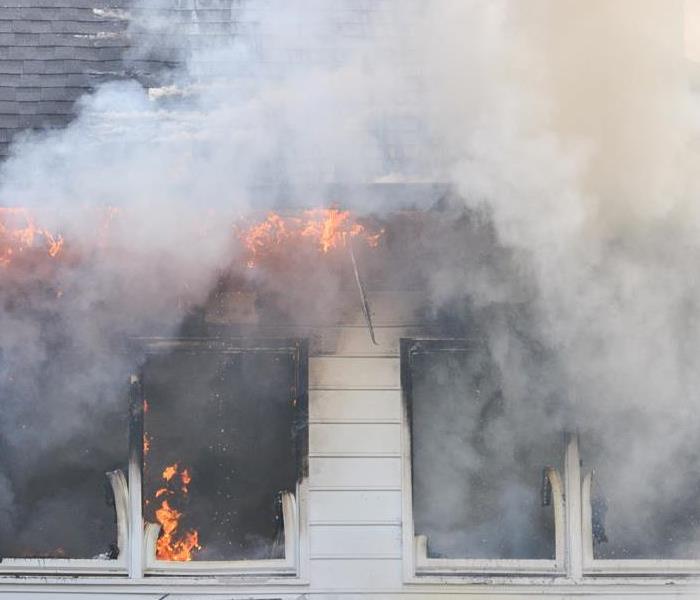 Recovering from a fire can be challenging. Call a professional for help.
Recovering from a fire can be challenging. Call a professional for help.
Experiencing a fire can be a traumatic and overwhelming event. After the flames have been extinguished, it is important to take immediate action to begin the recovery and restoration process. In this blog, we will provide you with a step-by-step guide on what to do after a fire to ensure safety, support, and a smoother path to recovery.
Ensure Safety
The first and foremost priority after a fire is to ensure the safety of yourself and your loved ones. If you have not done so already, contact emergency services to confirm that it is safe to re-enter your property. Do not enter your home or building until you have been given clearance to do so.
As soon as you are able, contact your insurance company to report the fire and begin the claims process. Provide them with all the necessary information and documentation, such as photographs, inventory lists, and any other evidence of damage. Be sure to follow their instructions and keep detailed records of all communication.
Assess the Damage
Once you have received permission to enter your property, carefully assess the damage caused by the fire. Document the extent of the damage by taking photographs or videos for insurance purposes. Make a detailed inventory of the items that have been lost or damaged.
If your home or building has suffered significant damage, it is crucial to take steps to secure the property. Arrange for temporary fencing, board up windows, and lock all doors to prevent unauthorized access. This will help protect your property and any remaining possessions.
Contact Restoration Professionals
Engage the services of professional fire damage restoration experts. They have the knowledge, expertise, and equipment to assess the damage accurately and begin the restoration process. Restoration professionals can help salvage and restore your property to its pre-fire condition and offer guidance on what can be salvaged.
Take steps to prevent further damage to your property. This may involve addressing water damage from firefighting efforts, tarping or covering areas exposed to the elements, and turning off utilities if necessary. Professional restoration specialists can guide you in mitigating additional damage.
Secure Temporary Housing
If your home or building is uninhabitable, find temporary housing for you and your family. Contact your insurance company to explore options for reimbursement of living expenses during the restoration process. Consider staying with family or friends, renting a temporary residence, or exploring local assistance programs.
Work closely with restoration professionals to salvage and clean any belongings that can be restored. They may suggest specialized cleaning techniques for clothes, furniture, and other items. Proper cleaning and restoration can help reduce the cost of replacement and ensure the safety of salvaged items.
Address Emotional and Mental Health
Experiencing a fire can be emotionally and mentally taxing. Seek support from friends, family, or professional counselors who can help you cope with the aftermath. Take care of yourself and your loved ones by practicing self-care and seeking professional help if needed.
Once the restoration process is underway, work with contractors and other professionals to rebuild and restore your property. Follow their guidance and communicate any concerns or specific requirements. Keep records of all expenses related to the rebuilding process.
Recovering from a fire can be a challenging journey, but by following these steps and seeking professional guidance, you can navigate the process more effectively. Remember to take care of yourself and lean on the support of others during this difficult time. With patience and determination, you can rebuild and restore your home or building, creating a fresh start after a fire.
Fire and Water Damage: The Unbreakable Connection
4/9/2023 (Permalink)
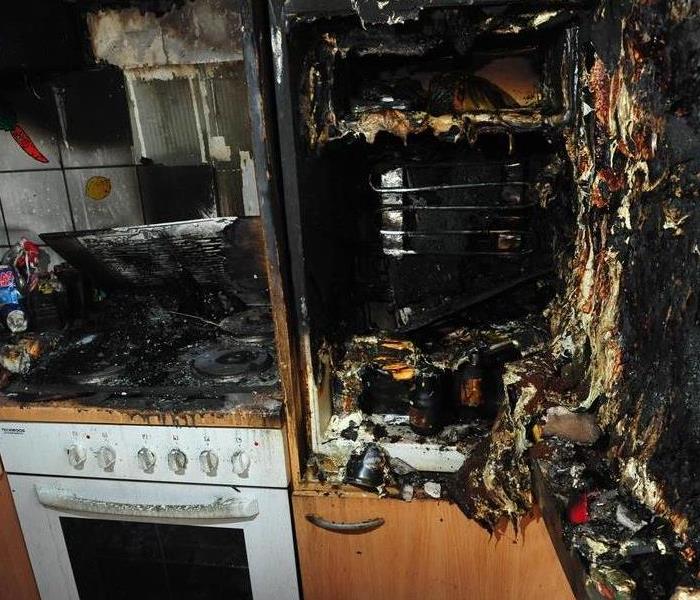 When fire damage happens in your home, give SERVPRO a call.
When fire damage happens in your home, give SERVPRO a call.
Fire and water damage are two of the most common causes of home damage. Fire damage can be caused by a fire in your home, or it can happen when you use a fire extinguisher on an electrical fire. Water damage can occur when there is flooding in your home, or if you leave something wet in one place for too long and mold develops.
The relationship between these two types of damage is obvious, if there's a fire in your house, it will likely cause some sort of water damage as well--but how exactly does this happen? And what does this mean for homeowners who want to avoid these types of problems altogether?
Effects of Fire Damage
When a fire breaks out, the damage can be extensive. The effects of smoke and soot on your property are just as damaging as the flames themselves. In fact, it's common for people to think that their home has been completely destroyed when they see smoke damage at first glance. Fire suppression systems are designed to prevent this type of damage from occurring by extinguishing fires before they get out of control and cause extensive structural damage or even loss of life.
However, even if you have an effective fire suppression system in place at your business or home, there will still be some residual effects from any fire that occurs on site and those effects can vary greatly depending on how long it took for firefighters to arrive on scene (or whether anyone was injured).
Effects of Water Damage
Water damage is a serious issue that can cause significant damage to your home. When water floods your home, it can cause mold growth and destroy property and belongings. If you have ever had to deal with this type of situation before, then you know how much work it takes to get everything back in order again.
Although flooding is one form of water damage that homeowners are most familiar with, there are other ways that water can infiltrate your home as well.
Causes of Leaks
Leaks from plumbing pipes or appliances (such as dishwashers) Roof leaks caused by storms or other weather events. Water seeping into cracks in foundations caused by settling over time
Fire and water damage go hand-in-hand. When a fire breaks out, it can cause extensive damage to your home or business. Not only will you have to replace any items that were destroyed by flames, but you may also need to repair structural damage caused by the fire itself.
The combination of these two disasters can lead to much higher repair costs than either one would have caused on its own. This is because there are certain steps that must be taken when repairing after both types of disasters.
Preventing Water Damage
Water damage is one of the most common causes of fire, and it's important to be aware of this when you're dealing with fire damage in your home.
Here are some tips for preventing water damage. Check for leaks around windows and doors, as well as any plumbing fixtures like sinks or toilets. If you find a leak, make sure it's fixed right away before it can cause more damage over time.
Use waterproofing products on walls that are prone to moisture (such as basements), especially if they're made out of wood or other flammable materials. These products will seal off cracks so that no water gets through them in the first place!
Consider installing sump pumps near your basement floor drains so that if there ever is an overflow from these drains due to flooding rains outside your home--or even just heavy rainstorms--the sump pumps will kick into action immediately and pump out all excess water before it has time get into any other parts of your house where things could catch fire easily like old furniture pieces lying around inside closets upstairs rooms upstairs bedrooms.
The 4 Leading Causes of Home Fires
8/27/2022 (Permalink)
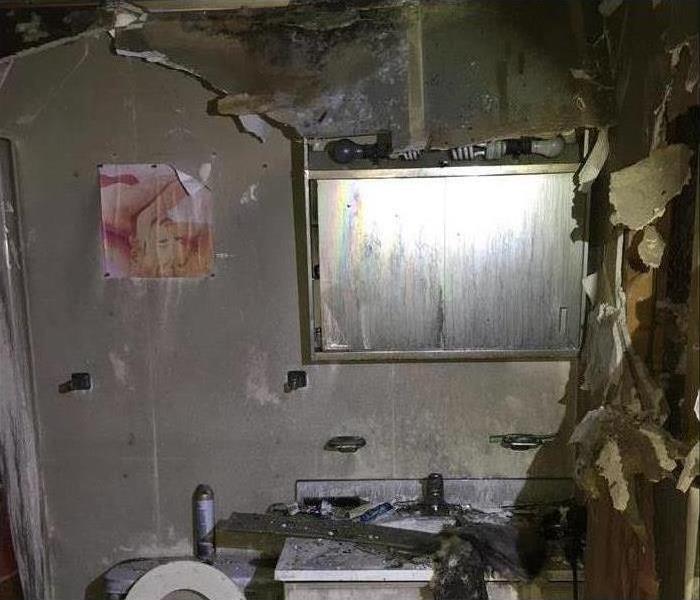 House fire in Ebensburg, PA
House fire in Ebensburg, PA
The Top Four Home Fire Causes
Fire statistics in the U.S. paint a picture of a disturbingly common problem. According to the National Fire Protection Association, a fire breaks out somewhere in the nation every 24 seconds. While progress has been made over the years, a home fire still happens frequently. Most of the fires are preventable with common-sense precautions. The leading causes of a fire show people often make unwise choices in their homes.
1. Cooking Fires - When it comes to fire causes in homes, this is among the most common fires. In addition to causing about 550 deaths a year, these fires account for about $1 billion in property damage. This type of home fire spikes around the holidays of Thanksgiving and Christmas.
2. Candle Fires - While candles can be soothing, they can also be dangerous. About 21 candle fires are reported every day in the U.S. December and January are the peak months for this fire type. They cause a higher amount of property damage than many other fires.
3. Home Grill Fires - This type of fire accounts for about 10,600 home fires each year. Though home grill fires do not cause a lot of deaths, they still cause a lot of damage to home structures.
4. Electrical Fires - This type of fire is caused when electrical systems malfunction. They are most common in old weather months. Electrical fires are often caused by arcing, and they result in many deaths and significant property damage every year.
A home fire is a devastating event for many families. To help people cope with the aftermath of a fire, a local fire remediation franchise in Ebensburg, PA, is often the best resource to aid in recovery. The technicians are experts in fire cleaning, and they can deal with both the effects of structural damage as well as smoke damage. The technicians can also offer excellent advice on fire precautions and avoiding a fire in the first place.
What Is a Board Up Service and Do I Need One?
4/22/2022 (Permalink)
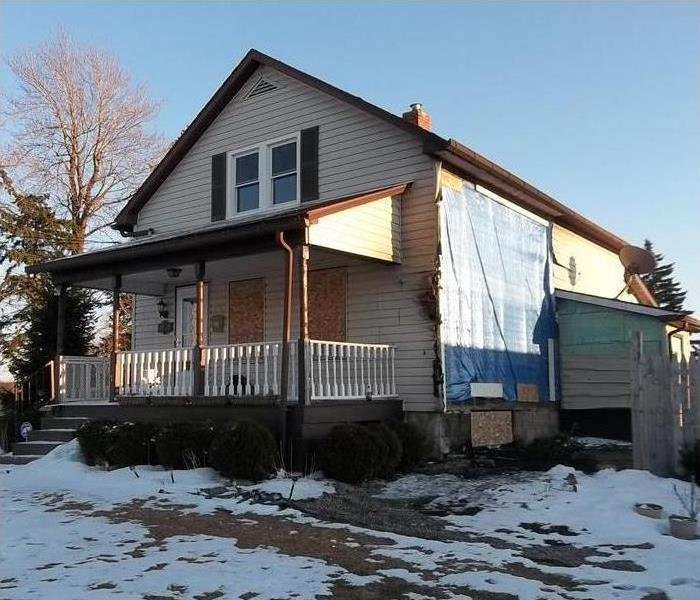 Secure your home with a board-up service after a fire.
Secure your home with a board-up service after a fire.
Is It Necessary to Hire a Board Up Service?
When your home has sustained fire damage in Ebensburg, PA, your first priority is to get your family settled in a safe place, not worry about your damaged home since it will be a while until everything can be repaired. Despite the challenges you're likely facing as you recover from this disaster, properly securing your home is important. One of the first things that will be recommended by a fire damage restoration company is an emergency board-up service. This service is an important part of your home restoration for several reasons.
1. Insurance
Most likely, your insurance company will require that your home is properly sealed between the occurrence of the damage and when the repairs are done. Insurance pays for what is originally quoted, and if more damage is done, you'll have to pay more.
2. Liability
If your home isn't properly secured by a board-up service, anyone who enters your home and gets injured could press charges.
3. Damage
Further damage from weather, animals, or humans makes an already difficult situation worse. Securing your home prevents most additional damage.
4. Property Loss
An open home is an open invitation to people who want what you have. While you may think there isn't much left, anything from appliances to pipes to your HVAC system can be stolen for profit, leaving you to foot the bill.
5. Professionalism
When you trust a company to do the board-up service for you, you can be confident that it will be done correctly. DIY may sound simple, but in addition to being a two-person job, you can cause more damage by improperly placing boards or your efforts simply aren't effective because you're not using the right materials.
Securing your home with a board-up service after a fire is not only recommended by most insurance companies, but you can have peace of mind knowing that your home will be protected until the restoration is complete.
Tips for Preventing a Fire Disaster at Your Commercial Property
3/23/2022 (Permalink)
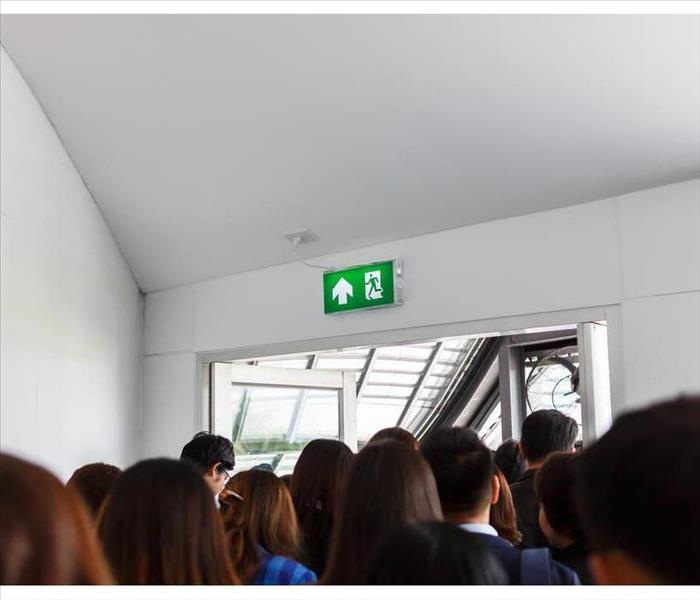 Fire preparation should also include your employees.
Fire preparation should also include your employees.
Fire Preparation Tips
Nobody wants a fire to happen to them in Summerhill, PA, especially if it affects their livelihood. So it is in your best interest to do what you can to reduce the likelihood of such an event and to implement fire preparation policies in case it does happen to you.
Risk Analysis
A good place to start is to identify where a fire is most likely to come from in your building and then target most of your disaster preparation in that area. You can also shore up your insurance to cover the types of damage you think it might incur. You should research the appropriate fire remediation services so that you don't have to worry about that after the fact. Some common fire sources are:
- A kitchen or a grease fire
- Electrical outlets
- Wildfires in your area
Develop an Emergency Plan
To mitigate the damage a fire can cause, fire preparation should also include your employees. You should choose an evacuation route and train employees regularly in their specific roles during an incident. So that everyone's lives aren't put on hold, you can come up with a plan for how to continue to run the business during the recovery period.
Protect Your Assets
To keep your fire damage losses to a minimum, you should back up all your important documents and files to a remote server or database. You could also consider keeping certain valuable equipment and materials at separate locations. It would be a good idea to maintain an updated inventory of all company property along with proof of each item's value.
It is always better to be safe than sorry when it comes to fire preparation. Although it can sometimes be inevitable, it is smart to do your best to prevent it from happening to your commercial property and have a plan in place should it occur anyway. As the scouts say, be prepared!
How to Tell When Your Dryer Vent Needs Cleaning
2/28/2022 (Permalink)
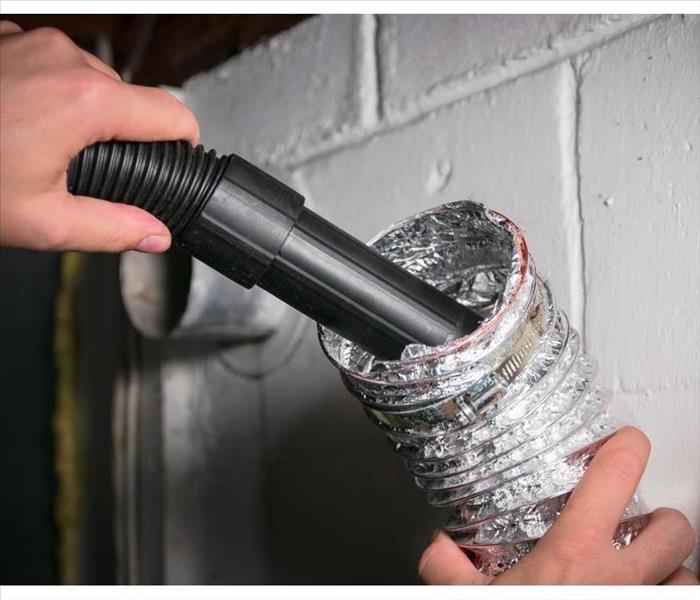 It's time to clean out your dryer vent.
It's time to clean out your dryer vent.
Prevent a Dryer Fire
If you own a home in Carrolltown, PA, fire safety is probably something you think about often. You've probably installed smoke detectors and have an extinguisher handy in case of a mishap. But have you taken a look at the vent on your dryer recently? Every year, thousands of homes are damaged due to the occurrence of a lint fire. Luckily, it's easy to tell when it's time to clean out your dryer vent. So, what should you look for in order to prevent a dryer fire?
1. There's a Burning Odor
A good indication that the vent needs cleaning is a burning smell. If lint is clogging up the drum casing, exhaust tube or trap, you could easily have a lint fire. When there's a burning odor coming from the dryer, turn it off and call a professional to service it.
2. Clothes and Dryer Are Both Very Hot
If the dryer is extremely warm when you touch the outside and your clothes feel really hot when you remove them, it's probably a blocked vent. When the vent is blocked, the hot air can't escape from the dryer.
3. Clothes Are Taking Forever to Dry
With a blocked vent, clothes might take up to three times as long as normal to get dry. When you put your clothes in for a regular cycle, you might find that they're still damp when you take them out. When the vent is blocked, it can't allow moisture to be released from the dryer.
4. Your Dryer Hasn't Been Inspected for a While
A vent cleaning professional should take a look at your dryer at least once a year. While you can certainly clean out the vent by yourself, hiring a professional will ensure that the job is done right, since they will have the right equipment to do a thorough cleaning and make sure the dryer in a safe condition for use.
The last thing you want is a lint fire in your home. By looking out for the obvious signs, you can be sure to prevent it from happening.
How To Create a Fire Escape Plan
1/29/2022 (Permalink)
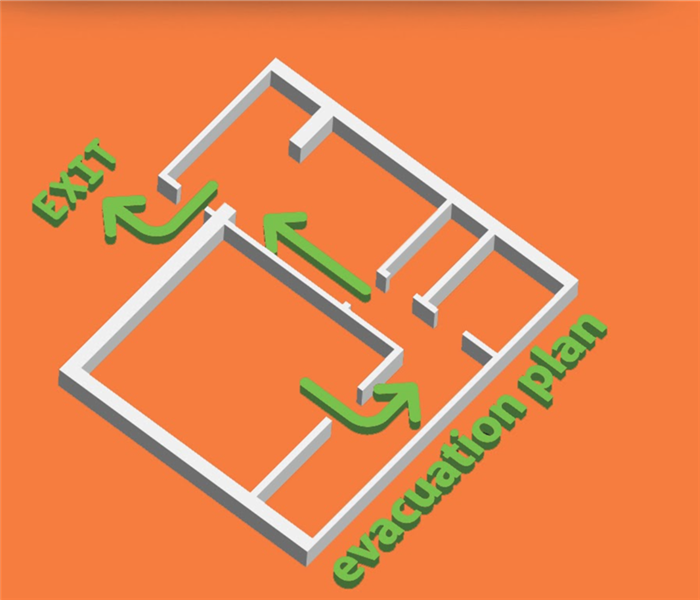 Every family should have a fire escape plan.
Every family should have a fire escape plan.
How to Make a Fire Exit Plan
Disaster and calamity can strike your home at any time. No matter how diligently you prepare, you can’t always prevent accidents and mishaps such as fires. It is possible, however, to be ready to get out of your home safely if a fire starts. Every family should have a fire escape plan. If you haven’t developed one yet, there are resources to help you. Once you’ve created and practiced your emergency escape plan for your home in Johnstown, PA, you can have peace of mind.
1. Meet and discuss what you’ll do in case of an emergency. The nature of emergencies is they often come with little or no warning. To help prevent major injury or death, you must be prepared to act immediately. To begin your fire escape plan, meet with the members of your family and talk about things such as what emergency alerts you have in the home and which ones you need; what the best route is out of the home and where you will go once you’re safely outside.
2. Evaluate your specific needs. Every family is different, so your emergency escape plan won’t be like the next person’s. Consider the ages of those in your family and think about physical limitations anyone may have. Include pets in your plan as well. Give every family member an assignment.
3. Practice your escape. If you practice your plan, chances of success are better in the real event. Time how fast you can get out of your home and to your safe spot. Then, work on shaving the seconds off that time. The more you practice, the more confident and comfortable everyone will feel.
A good fire escape plan from your home in Johnstown, PA, will help minimize the confusion and panic if a real fire occurs. If you need help with your emergency escape plan, the American Red Cross has some excellent resources.





 24/7 Emergency Service
24/7 Emergency Service







